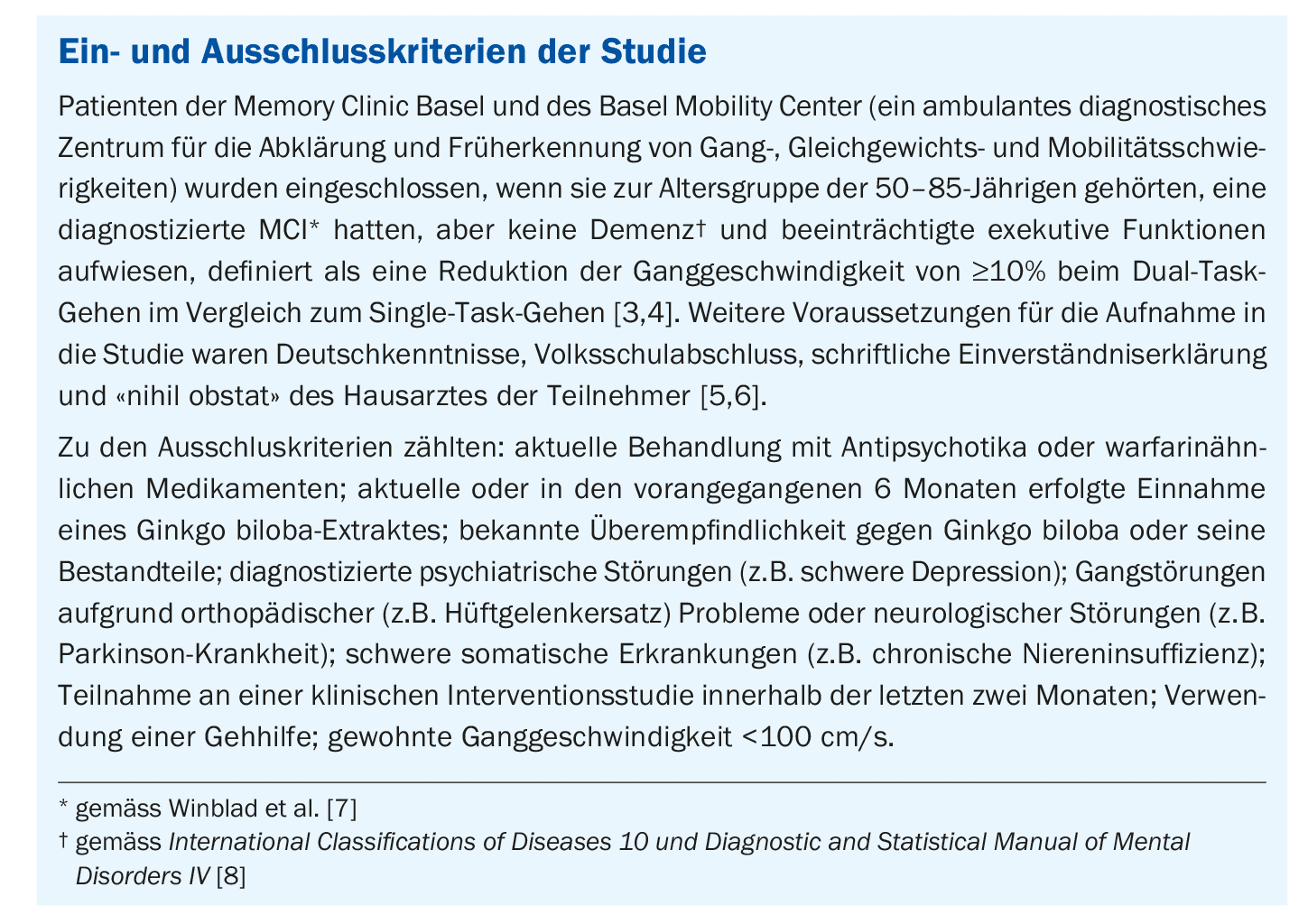Many older people with MCI have reduced gait stability. It has been shown that improved dual tasking during walking significantly reduces the risk of falling. An exploratory study was conducted to investigate the effects of Ginkgo biloba extract on gait parameters during dual-tasking. The results were better in the verum group compared to the placebo group.
Study findings indicate that reduced cerebral blood flow in the frontal lobe is significantly associated with reduced gait stability, which manifests itself in reduced gait speed and stability [1]. Ginkgo biloba extract has been shown to improve cerebral microcirculation in brain regions relevant to gait stability [2]. Against this background, a research team launched a randomized controlled exploratory study to investigate the effects of Ginkgo biloba extract on gait parameters [3]. The study included 50 patients aged 50 to 85 years with mild cognitive impairment ( MCI) and associated gait problems in dual-task tasks (slowing of walking speed by at least 10% compared to single-task). This was a monocentric study conducted at the University Hospital of Basel. The study results were published in the journal Aging Clinical and Experimental Research.
Gait parameters improved under Ginkgo treatment
The study participants received either a Ginkgo biloba extract (120 mg, 2×/d) or placebo for a period of 6 months. This was followed by an open-label phase of a further 6 months in which both groups received identical amounts of the extract. Various gait parameters were recorded at baseline and after 3, 6 and 12 months. The primary and secondary endpoints were gait speed and stride time. Gait analysis was carried out using the GAITRite® system, a 10 m long electronic, pressure-sensitive gait carpet that can detect even minor changes in gait.
In the single-task condition, patients were instructed to walk at their normal speed, while in the dual-task condition they were asked to perform additional tasks (counting backwards from 50 in steps of two or naming animals). This is a well-established paradigm for testing motor cognitive interference, which is thought to indicate a decrease in gait control. The data analysis showed that after six months, dual-task skills tended to improve in the verum group. Step frequency was significantly higher with Ginkgo biloba treatment compared to the placebo (p = 0.019, d = 0.71). As improved dual-tasking during walking reduces the risk of falling, this is of clinical relevance. Furthermore, it was shown that the positive effects on gait parameters were more pronounced with increasing duration of gingko treatment.
Literature:
- Nakamura T, et al: Postural and gait disturbance correlated with decreased frontal cerebral blood flow in Alzheimer disease. Alzheimer Dis Assoc Disord 1997; 11: 132-139.
- Yoshitake T, Yoshitake S, Kehr J: The Ginkgo biloba extract EGb 761(R) and its main constituent flavonoids and ginkgolides increase extracellular dopamine levels in the rat prefrontal cortex. Br J Pharmacol 2010; 159: 659-668.
- Gschwind YJ, et al: Ginkgo biloba special extract LI 1370 improves dual-task walking in patients with MCI: a randomized, double-blind, placebo-controlled exploratory study. Aging Clin Exp Res 2017; 29(4): 609-619.
- Springer S, et al: Dual-tasking effects on gait variability: the role of aging, falls, and executive function. Mov Disord 2006; 21: 950-957.
- Gauthier S, Schlaefke S: Efficacy and tolerability of Ginkgo biloba extract EGb 761® in dementia: a systematic review and meta-analysis of randomized placebo-controlled trials. Clin Interv Aging 2014; 9: 2065-2077.
- Ahlemeyer B, Krieglstein J: Neuroprotective effects of Ginkgo biloba extract. Cell Mol Life Sci 2003; 60: 1779-1792.
- Winblad B, et al: Mild cognitive impairment – beyond controversies, towards a consensus: report of the International Working Group on Mild Cognitive Impairment. J Intern Med 2004; 256: 240-246.
- Kressig RW: Recommendations for the diagnosis of Mild Cognitive Impairment. GP Practice 2009; 15: 2-3.
FAMILY PHYSICIAN PRACTICE 2024; 19(7): 18












